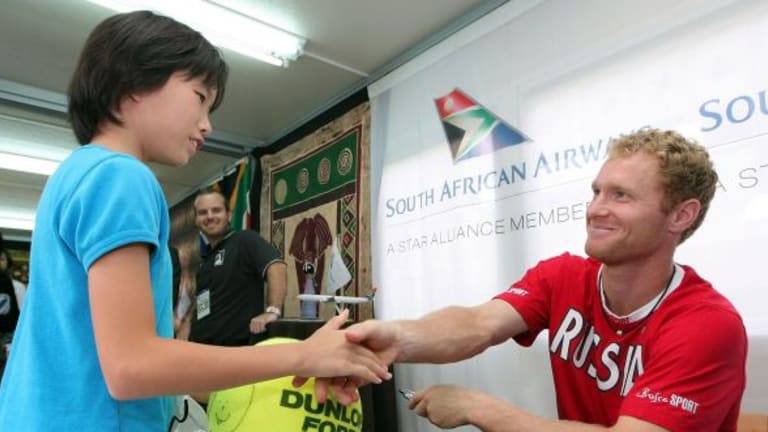Howdy, everyone. I hope you had a great weekend and enjoyed your Monday fare.
I posted some thoughts over at ESPN the other day on the latest gambling-related revelations, made this time by Dmitry Tursunov. I didn't think there was much more to say about this rolling scandal, but then I got to thinking about how all of these confessions have been filtering out to SportsWorld: via the Internet and interviews with the media, rather than through the official channel of the ATP. This is a strange and disconcerting aspect of the controversy, because it suggests that the players are stepping forward to make their confessions independent of the body that theoretically governs and keeps the order in the game they play. It's a variation of the familiar "inmates running the asylum" paradigm.
This reveals a surprising lack of central authority (or the failure to exert that authority) by the ATP. I believe in transparency and accountability, and I don't want to see anyone muzzled. But ever since the festering gambling controversy was ignited in Sopot, this has seemed like one of those cases where the ATP and its minions should have reached out to the players and essentially tell them: **
**
This is, admittedly, a tough call.
For one thing, we all have the basic right to speak freely. On the other hand, how many of us do, in issues critical to the way we or our employers/partners are perceived? There is a world of difference between discretion - even if it is encouraged discretion - and the suppression of important information. I also know that if the ATP successfully persuaded the players that this is an "internal affairs" matter, there is a danger that the ATP would whitewash or downplay the problem at hand. But I believe in the basic integrity of the ATP, and I think it's naive to deny the ATP both the mandate and right to exercise damage control. Failing to do so hurts the players (although this never seems to trouble players who want to pop off on any subject) themselves more than anyone else. Hail, the sponsors can always move on to golf, the way Mercedes just did.
It's funny but the concept of "damage control" is anathema to many, yet we - maybe I should say I - practice it just about every day, starting in my own family.
So to me, the ideal scenario after the news broke in Sopot would have been for the ATP to successfully convince the players that it isn't in their best interest to broadcast their speculations or even their experiences with match-fixers - at least not in a scattershot, catch-as-catch-can fashion. This was an ideal time for the ATP to close ranks - circle the wagons, if you prefer - and develop a strategy for dealing with the gambling issue in a disciplined but aggressive and ethically supportable way. And if the ATP itself were either lax about addressing the issue, or crossed the line between professional damage control and whitewash, the players could and should make their feelings known.
That it doesn't appear to be working out that way is a shame, and it has only exacerbated an already unfortunate situation. Nobody wins when institutions fail to control endemic, institution-related problems in situations where the crisis is not significantly related to the way the institution functions (in that case, the conflict-of-interest in the institution would be overwhelming).
No matter what your beef is with the ATP, you certainly can't accuse the organization of somehow having created this problem, or benefiting from it. There isn't a better case of the failure of individual responsibility than that of players who throw or otherwise influence matches in order to please a betting interest. For that reason, I don't see the embrace of a self-imposed gag rule as pandering to the institution, or being a an un-wise step toward allowing the the accused to judge himself. In fact, this is about as good an example of a problem that that ATP ought to control and solve with an aggressive, disciplined, institution-wide strategy as you can find. The ATP doesn't even have to worry about making a decision that would alienate its constituency, top players, or sponsors and promoters. Nobody wants to see gambling scandals in tennis, and nobody but gamblers and complicit players benefit from them.
Yet while the ATP investigation presumably continues in silence, the news wire sizzle with the latest reports of attempted match-fixing. This is an on-going public relations disaster, in more ways than one. It also provides an interesting window into how the ATP Tour operates. Granted, the ATP is not the NFL or Major League Baseball. It simply doesn't have the resources to harbor something it did not appear, until recently, to need: an active corruption wing. The ATP in these decidedly up-and-down years has been intensively focused on administrative duties (including maintaining what has become an excellent statistics department - hat tip to Greg Sharko) and marketing. And don't think that the cost of adopting a strong anti-drug policy was a small investment, either.
It's pretty clear that ATP has been reactive ever since the Sopot story broke, but it's a little surprising that it hasn't gotten hold of the situation in terms of managing and containing it. And one thing I'm sure about - if the ATP has been blind-sided and overwhelmed by events, the WTA is in far, far greater danger of being helpless to deal with a scandal of this magnitude, should it land on its doorstep.
PS - Bob Larson today is reporting on his subscription-onlyBusiness News webpage that the ITF, ATP and WTA are working together to develop strategies for curbing potential match-fixing, one component of which may be banning of cell phones in locker rooms and players' lounges. The most interesting thing about this almost hilarious finger-in-the-dike plan is that it does underscore how difficult it would be to halt the flow of information in the digital age. But at least they're talking. . .
Via Larson (or independently) you can read the story about the Australian Open throwing the official booking agents off the tournament grounds. It's a nice symbolic gesture, but again - how effective can it be?
These are tough times for tennis.

